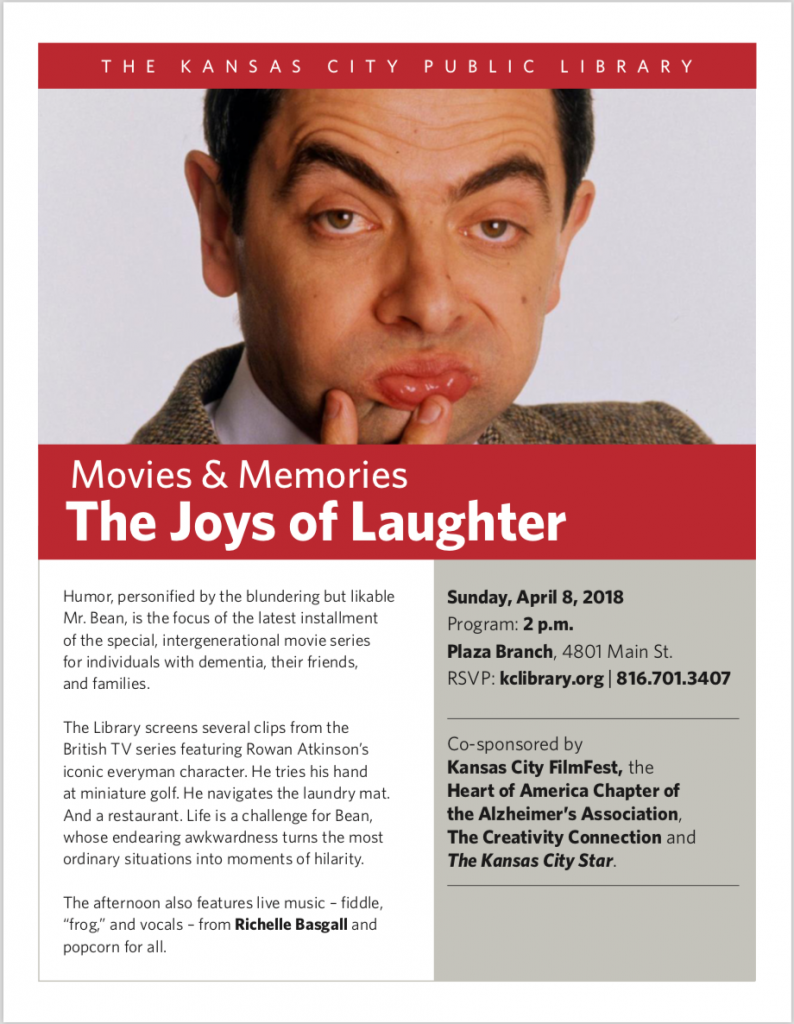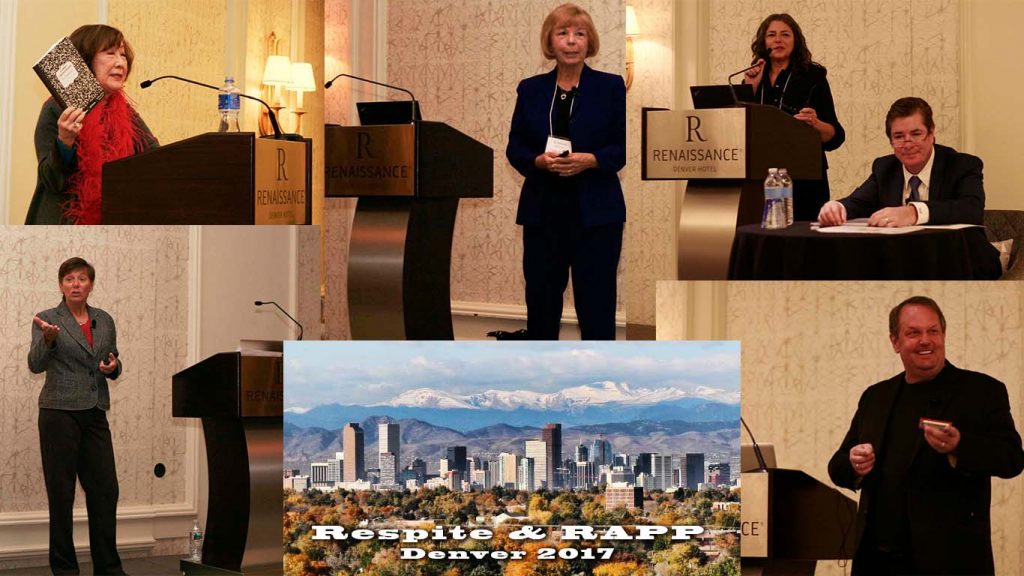Caregiving
Movies and Memories: Laughter Triumphs Over Weather
It’s a Sunday morning in early April and we were excited about our Movies and Memories laughter program that afternoon at 2:00.
Then, the unthinkable happened. It started to snow, blanketing the daffodils and tulips with just enough flakes to make people want to cozy up at home.
What did we do? Laugh, of course.
Laughter was the theme of our April program and we had excerpts from the inestimable Mr. Bean to anchor our program.
As Emily from the Kansas City Public Library, Plaza Branch, made our popcorn and other library staff readied the technology, we accepted the fact that we might have only our intrepid volunteers in the audience. We all vowed to have a great time anyway.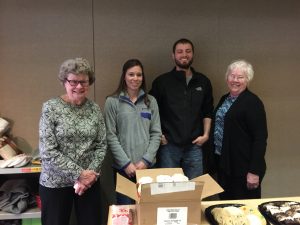
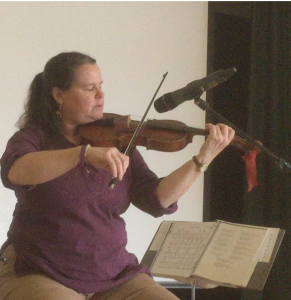 Musician Richelle Basgall regaled us with songs and stories and our guests began to arrive. Soon we had about 30 people who ignored the weather and were ready for fun. And fun we had. One of our volunteers brought us sumptuous cookies and small cakes. The aroma of fresh popcorn warmed us all and we laughed our way through a hilarious clip of Mr. Bean playing miniature golf. Then we passed out jokes, which we laughingly shared with each other. (What kind of sandwiches do astronauts eat: Launch meat! Why did the oil painting get sent to jail? It was framed!)
Musician Richelle Basgall regaled us with songs and stories and our guests began to arrive. Soon we had about 30 people who ignored the weather and were ready for fun. And fun we had. One of our volunteers brought us sumptuous cookies and small cakes. The aroma of fresh popcorn warmed us all and we laughed our way through a hilarious clip of Mr. Bean playing miniature golf. Then we passed out jokes, which we laughingly shared with each other. (What kind of sandwiches do astronauts eat: Launch meat! Why did the oil painting get sent to jail? It was framed!)
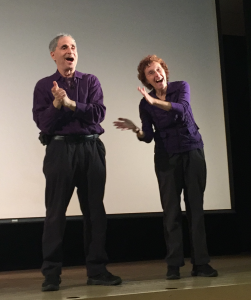 After watching Mr. Bean’s laundromat escapades, we had a laughter yoga session. We didn’t have to worry about traditional physical yoga postures—laughter yoga includes clapping, gestures, playfulness, and breathing. Everyone was a hearty laugher and we were all relaxed and smiling as we watched Mr. Bean’s horror as he tried to cope with raw oysters at a fancy restaurant.
After watching Mr. Bean’s laundromat escapades, we had a laughter yoga session. We didn’t have to worry about traditional physical yoga postures—laughter yoga includes clapping, gestures, playfulness, and breathing. Everyone was a hearty laugher and we were all relaxed and smiling as we watched Mr. Bean’s horror as he tried to cope with raw oysters at a fancy restaurant.
Our ending surprise was a delicious way to take Mr. Bean home— gourmet jelly beans!!
Click here for a short video experience.
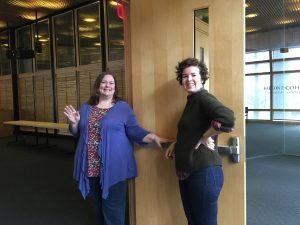 Stay tuned for our next Movies and Memories event in August!
Stay tuned for our next Movies and Memories event in August!
Want to have a movies and memories event right in your own home?
Here are a few tips:
If you’d like to make this an intergenerational experience, select a movie or clips you all might enjoy.
Choose a time of day when the person living with dementia will have good energy.
Get your favorite movie treats ready.
Create times to pause and chat about what you’ve seen.
Print out simple jokes as a great way to spread the laughter.
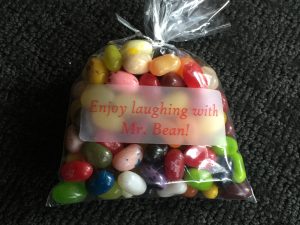 If you wish, offer a surprise at the end, either something that reminds you to laugh or smile. And if you like sweets, our jelly beans were a huge hit! With all those flavors, you have a lot to talk about!
If you wish, offer a surprise at the end, either something that reminds you to laugh or smile. And if you like sweets, our jelly beans were a huge hit! With all those flavors, you have a lot to talk about!
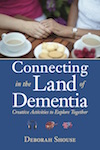
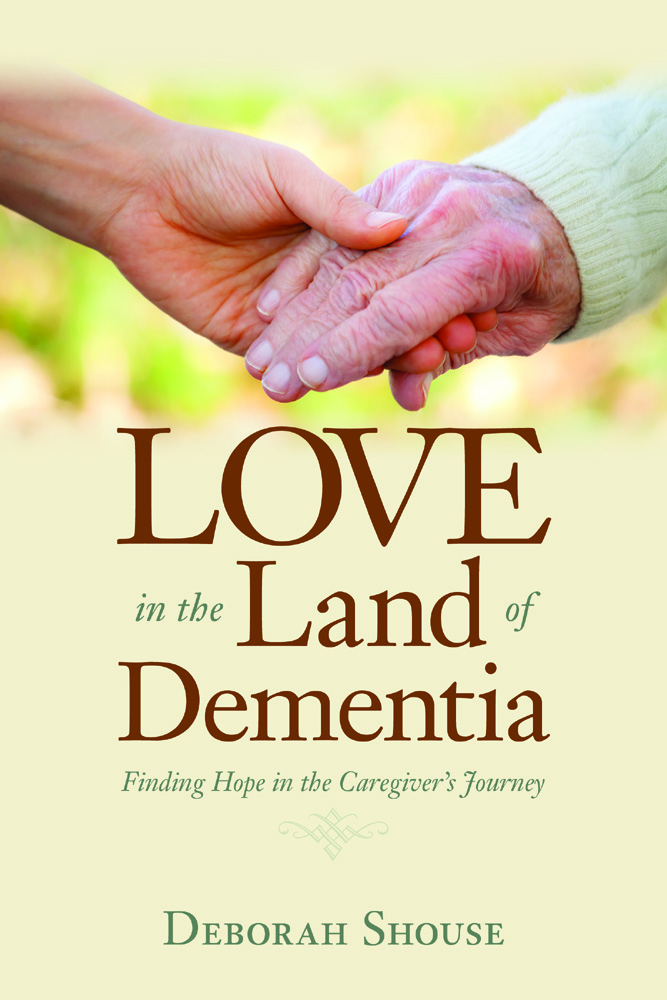
The Power of Play in the Dementia Journey
 Josh Rice, a theatre maker and teaching artist, discovered the power of play in the dementia journey when he was still in graduate school. As part of a school project, he partnered with a senior living community on a therapeutic puppetry and improv-based program for people living with dementia.
Josh Rice, a theatre maker and teaching artist, discovered the power of play in the dementia journey when he was still in graduate school. As part of a school project, he partnered with a senior living community on a therapeutic puppetry and improv-based program for people living with dementia.
Together, Josh and the seniors designed and made puppets, and created performances that included songs, personal stories, and comedy. As he worked with the new artists, he noticed people were using their puppets to tell stories. They expressed emotions and they enjoyed the chance to play and have fun. Staff applauded the participants’ short-term memory gains and tactile improvements.
“Plus, we were creating exciting work and performing for people,” Josh says.
Puppetry
One afternoon, a woman who was having a difficult day burst into the puppetry classroom. She was non-verbal but acted out aggressively in a way that could have potentially agitated others. As Josh and the students were rehearsing, she walked in and before she could disrupt the class, Josh made eye contact with her, and gently touched her shoulder. He quietly talked to her and invited her to join in or sit and watch. Within minutes she calmed down.
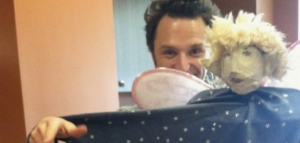 “I put a puppet in her hand and all of a sudden her language came back. It was like a switch had been turned on,” Josh says. This woman filled him with hope and inspired him. “I want people to understand that people who are living with dementia sometimes need us to be patient and keep giving them chances,” he says.
“I put a puppet in her hand and all of a sudden her language came back. It was like a switch had been turned on,” Josh says. This woman filled him with hope and inspired him. “I want people to understand that people who are living with dementia sometimes need us to be patient and keep giving them chances,” he says.
Being in the Moment
Josh knew the potential power of theatrical play and experimented with improv sessions for people living with dementia. The experiment worked.
“For improv, you have to listen and react,” Josh says. “The past or future doesn’t matter; it’s all about the present moment.”
He created a safe, nurturing, and creative atmosphere, offering structured improvisations, and invited his new improv team to play.
“They loved it and it was a thrill to watch them discovering new things and coming up with creative dialogues,” Josh says. “Play is an integral part of our lives and most of us need more of it.”


Dementia in the Land of Vietnam
“We are here to see Dr. Nguyen Thanh Binh, head of the Department of Neuroloy and Alzheimer Diseaese,” I tell the guard at the National Geriatric Hospital of Vietnam in Hanoi, showing him my folded paper with her name printed on it.
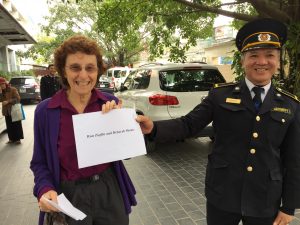 He grins, then points to a full size sheet of paper in the security booth’s window with our names printed on it. We follow him into the hospital and up a flight of stairs. After a short wait, Dr. Binh warmly welcomes us into her office. She has a table ready with chairs and tells us she has invited others from her department to talk to us as well. Another Dr. Nguyen Thanh Binh arrives. Her Phd thesis was on easing the burden for family caregivers. Dr. Ngan Thi Hong Anh, doctor of rehabilitation, joins us. She seeks non-medical solutions for improving quality of life. Nguyen Ngoc Anh, RN, completes our group. She works daily, communicating with and caring for people who are living with dementia.
He grins, then points to a full size sheet of paper in the security booth’s window with our names printed on it. We follow him into the hospital and up a flight of stairs. After a short wait, Dr. Binh warmly welcomes us into her office. She has a table ready with chairs and tells us she has invited others from her department to talk to us as well. Another Dr. Nguyen Thanh Binh arrives. Her Phd thesis was on easing the burden for family caregivers. Dr. Ngan Thi Hong Anh, doctor of rehabilitation, joins us. She seeks non-medical solutions for improving quality of life. Nguyen Ngoc Anh, RN, completes our group. She works daily, communicating with and caring for people who are living with dementia.
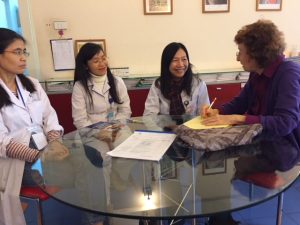 For two years. Dr. Binh and her team have been running a pilot study, inviting people who are living with dementia to attend a three day a week program that focuses on engaging socially, physically, emotionally, and intellectually. They use music therapy techniques, they bake traditional cakes together, and they enjoy various arts and crafts projects. All these therapies offer physical and occupational therapies, as well as vital social interactions. The project has been a huge success, with both family caregivers and people living with dementia enjoying the results. Besides giving the caregivers a much needed respite, families report improved quality of life and and increased abilities in the activities of daily living.
For two years. Dr. Binh and her team have been running a pilot study, inviting people who are living with dementia to attend a three day a week program that focuses on engaging socially, physically, emotionally, and intellectually. They use music therapy techniques, they bake traditional cakes together, and they enjoy various arts and crafts projects. All these therapies offer physical and occupational therapies, as well as vital social interactions. The project has been a huge success, with both family caregivers and people living with dementia enjoying the results. Besides giving the caregivers a much needed respite, families report improved quality of life and and increased abilities in the activities of daily living.
“Symptoms improve,” Dr. Binh reports. “Patients want to keep attending and families have their burdens eased.”
Dr. Binh and her team have extended the program.
 Often people come to the hospital, seeking answers to issues related to memory loss. Many elders live at home with extended families, and their children and grandchildren are frequently confounded by their cognitive impairments and other symptoms of dementia. Dr. Binh and her associates offer education, information, and comfort. They describe the disease and try to help families move beyond their initial feelings of hopelessness. They encourage families to accept and embrace their elder and support him or her in living a meaningful life.
Often people come to the hospital, seeking answers to issues related to memory loss. Many elders live at home with extended families, and their children and grandchildren are frequently confounded by their cognitive impairments and other symptoms of dementia. Dr. Binh and her associates offer education, information, and comfort. They describe the disease and try to help families move beyond their initial feelings of hopelessness. They encourage families to accept and embrace their elder and support him or her in living a meaningful life.
We left our meeting with these remarkable women feeling inspired. They are doing important work and making a difference for the people of Hanoi and Vietnam.


A Winning Combination: Children, Exercise, and Music
An orderly group of five-year-olds walk into the dining room at Vernon Manor in Viroqua, Wisconsin. The residents are waiting for them. Each child goes up to an elder and introduces him or her self. Then Ingrid Constalie, AD-BC, CDP, Board Certified Activity Director and Certified Dementia Practitioner, talks to the assemblage about the importance of staying fit. The residents nod sagely: many of them are in their eighties and nineties and they exercise every day. But the days that the kindergartners join them are the best, a winning combination or children, exercise, and music.
The residents love teaching the kids the alphabetic movements to the iconic YMCA song. And the kids are a burst of giggles and wiggles as they fold their arms into wings, strut around, and teach everyone The Chicken Dance.
Ingrid’s focus is creating moments of joy, engagement, and connection.
Her intergenerational activities spark the residents and reduce the stigmas of aging and dementia by educating and informing local children, teens, their teachers, and other members of the community.
“This dancing and exercise exchange is simple, energizing, and very successful,” Ingrid says.
Sing-O at Bingo
Music Bingo offers middle schoolers a chance to work with Ingrid’s elders.
“This is about creating a good experience for your partners,” Ingrid coaches the children in advance. “You are their connection to the world.”
Ingrid plays an opening melody, using songs such as “Happy Trails,” “You Are My Sunshine,” and “Singing In the Rain.” Those who know the title shout it out. Often, partners confer with each other. The children help locate the song title on the bingo card and place a poker chip on each answer. Even people living with advanced dementia enjoy listening to music and being around the children.
Most of the time, the school children are chatty and at ease. But one girl was scared coming into the care community.
“I paired her with Helen, a woman deep into dementia,” Ingrid says. “Within minute, Helen had her arm around the girl and they were both laughing.”
Even children who act up at school are wonderfully behaved during the Bingo experience.
Creating Comparisons and Compassion
Recently, Ingrid orchestrated a project with a high school English class. They interviewed residents and did a comparison and a contrast. For example: “While Clara is getting out of bed with the assistance of staff, I am getting ready for school. While she wheels herself down a long hallway to a dining room, I am eating toast with my sister.”
The teenage journalists asked simple questions, like “What is your morning like?” “How do you spend your afternoon?” “How do you like to dress?”
The students wrote up the results and made booklets. One family was so inspired by the insights in the booklet, they later read parts of it at the woman’s funeral.
Ingrid’s intergenerational connections explore understanding, create empathy, and help create exciting new relationships.


Six Secrets of Dementia Inclusive Holiday Cooking
I named my brother Dan, our head chef, first. Then I included the support team—myself, my mom, my daughters and nephews.
“Did I help?” Mom whispered as I passed her the mashed potatoes.
“You sure did,” I told her. ”You mashed the potatoes, put the marshmallows on the sweet potato casserole, and mixed the fruit salad.”
“That’s good,” she said. “I like to help.”
Our desire to help and contribute to seasonal celebrations doesn’t end with a diagnosis of dementia. It’s lovely to linger in the kitchen together, preparing food for the holidays. It’s even lovelier when you can adapt and enjoy dementia inclusive holiday cooking so that people of varying abilities can participate.
Rebecca Katz, author of The Healthy Mind Cookbook, sees food as a great equalizer, something anyone can enjoy regardless of abilities. Fixing a delicacy for someone offers a tangible and delicious way to give back.
Here are six secrets of iementia Inclusive holiday cooking.
- Leaf through a favorite family cookbook or recipe box and use the pictures and recipes as a catalyst for conversation. Ask open-ended questions, such as, ”What does that brownie recipe make you think of?” “What do you like about the holiday season?”
- Chose a time of day when you’re both rested.
- Create a comfortable kitchen environment, by playing familiar seasonal songs you can both hum or sing along to. Reduce extraneous noise and distractions, such as a television in the background.
- If you wish, take photos during the experience. That way, you can relive the adventure and share with family and friends.
- Indulge in instant gratification, if possible, by sampling your work when the cooking is complete.
- Even if the person living with dementia can’t help prepare food, he can still enjoy sitting in on the action and the conversation.
Whether you’re stirring a pot of orzo or dropping mint leaves into cool water, enjoy your time of creation and connection in the kitchen.
A longer version of this piece originally appeared on Joan Lunden’s excellent website: Enjoy Dementia Inclusive Holiday Cooking. Thanks to Sue Fitzsimmons, MS, ARNP, Judith Fertig, author of The Memory of Lemon, Kate Pierce, LMSW, Alzheimer’s Association Greater Michigan Chapter, and Rebecca Katz, author of The Healthy Mind Cookbook
Deborah Shouse is the author of Connecting in the Land of Dementia: Creative Activities to Explore Together and Love in the Land of Dementia: Finding Hope in the Caregiver’s Journey.
7 Tips for Reducing Caregiver Isolation
Some years ago, when my mom was diagnosed with dementia, I didn’t know anyone else who was going through this journey. I felt very alone, even though I had a beautiful network of friends. I turned to writing to help me make sense of the situation. Eventually, I gathered the courage to share my personal essays with others, often through simply reading my stories aloud to friends and family. Being able to share my thoughts and feelings on this deeply meaningful dementia experience was so therapeutic, and it inspired me to reach out to other caregivers. Through my years as a family caregiver and through interviewing dozens of caregivers and experts in the field of dementia, I gleaned these 7 tips for reducing caregiver isolation.
Listening
When my friend Karen asked me to tell her more about my mom’s life, I was thrilled. I had been so immersed in my caregiving responsibilities, I had forgotten Mom’s fascinating adventures as a nurse in WWII, her worldwide travels, and more. Simply asking questions about the person who is living with dementia and listening avidly to the stories is a gift to the caregiver.
Visiting
“Your mother is so interesting,” my friend Jane said. Jane had offered to simply come to my house and have a short visit with me and Mom. My mother was going through a period of repetition and I had heard her tale of the natural hot springs in Iceland at least 113 times. But watching Jane lean forward, ask cogent questions, and smile at Mom allowed me to appreciate Mom’s stories in a new way. These were cornerstones in my mother’s life and Jane’s interest reminded me what treasures they were.
Enriching
Mom had been a vibrant movie-goer, an avid opera lover, and an ardent museum enthusiast. But when she could no longer go out, I loved it when people offered to bring arts, culture, and the occasional dog, to us. Studies show that even indirect contact with animals reduces stress. Visits from small dogs and cuddly babies boosted both our spirits and helped us feel connected with our community.
Bringing over an art book and gazing at favorite painters together invited out the creative spirit and were a catalyst for open-ended conversation. Singing and playing music with others stirred up positive memories and filled us with happiness and well-being.
Exercising
So often, caregivers forget the power of fresh air and exercise. They forget the joy of sunshine and trees. When they don’t have the steam to set out on their own, offering to take them on a stroll, a run, to a yoga class, or just to sit on a bench in a park, can offer moments of connection and renewal.
Noticing
“What can I do for you?” my life-partner often asked. Frequently, I was so overwhelmed I had no answer. So he asked me concrete questions. “Do you need any errands run?” “Would you like me to make dinner?” “Are there phone calls I can help you make? Grocery shopping I can do?” Offering to do simple tasks helped me understand I did not have to soldier through this alone. Help was all around me and one of my spiritual journeys was learning how to receive it.
Inviting
It’s not always easy to stay connected with friends who are living with dementia and their caregivers, but it is so worth it. Even when my mother felt lost at social gatherings, she still enjoyed the energy of being around empathetic friends. Even when she didn’t understand every speck of conversation, she relished being around others and meeting new people. So did my father and so did I. Having friends reach out with invitations reminded us we were still part of our community.
Asking
Sometimes we don’t know what to say to our friends who are caregivers for those living with dementia. We don’t know what to do. Then it’s time to simply state the truth and tell them, “I want to be there for you, to understand what you’re going through. I want to support you, and I don’t quite know how to do it. Can you guide me?”
Chances are the answer will be a warm hug and a resounding, “Yes.”


Inside Dementia: Finding Gifts in the Journey
“My husband and I have been married for 53 years,” a woman with delicately curled silver hair and mournful eyes told the group. “But in the two years since he was diagnosed with dementia, our relationship has changed.” She dabs at her eyes with a tissue and takes a breath. “It has grown even stronger. We are closer than we’ve ever been.”
Ron and I were in a conference room of caregivers in Ft. Wayne, Indiana, presenting for the Greater Indiana Chapter of the Alzheimer’s Association. We had just shared my story, Love in the Land of Dementia, and we were all talking about the gifts we have found in the dementia journey.
Another woman, whose husband was newly diagnosed, talked about her frustration and impatience before the diagnoses.
“Now that I understand what is going on, I have vowed to be more patient. I don’t want to waste a minute of our time together.”
“My husband doesn’t know who I am right now,” another woman said. “But the other day, he gave me such a compliment. He told me, ‘I want to marry you.’”
She told us how she rummaged in her cedar chest and showed her husband their marriage certificate. He read it with interest. Then he looked at her, eyes shining, and repeated, “I want to marry you.” Those words, so filled with love, lifted her spirits immeasurably. “To think that even now, when he doesn’t remember much of our lives together, he still loves me so much, that means a lot to me.”
She smiled, as we all applauded this amazing love.
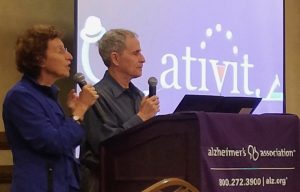 We heard more stories of amazing love at our earlier presentation in Merrillville, Indiana. When we talked about the gifts and blessings we had each discovered in the dementia journey, one woman told us, “I find it an honor to take care of my mother. She has done so much for me and I am lucky to get to care for her right now. I am glad to be able to show my unconditional love for her.”
We heard more stories of amazing love at our earlier presentation in Merrillville, Indiana. When we talked about the gifts and blessings we had each discovered in the dementia journey, one woman told us, “I find it an honor to take care of my mother. She has done so much for me and I am lucky to get to care for her right now. I am glad to be able to show my unconditional love for her.”
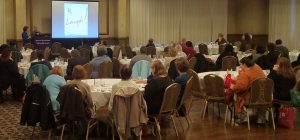
People shared many blessings—patience, the increased ability to live in the present, gratitude, flexibility, humor—but a deepening of love was the overarching message. We felt it during our own caregiving journeys, and we felt it deeply in the presence of those caregivers.
“The best and most beautiful things in this world cannot be seen or even heard, but must be felt with the heart.” Helen Keller
To learn more about the work the Greater Indiana Chapter of the Alzheimer’s Association is doing, please visit : https://www.alz.org/indiana/


Everyday Heroes and Nine Great Things We Learned This Weekend
This weekend we were lucky to be around a lot of heroes—the staff and grantees of The Brookdale Foundation Group, which supports national Relatives as Parents Programs, along with Group Respite programs. We loved the sense of commitment and community we felt at this event and we also enjoyed learning from other speakers and the attendees. Here are the nine great things we learned from this weekend’s conference.
I.
Explain
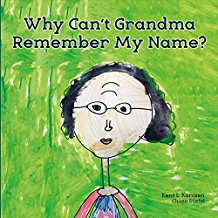 Kent Karosen, President and CEO of the Fisher Center for Alzheimer’s Research, spoke about his new children’s book, Why Can’t Grandma Remember My Name? Written about the way the brain is impacted by dementia and the affects it has on children, the book is illustrated in brilliantly colorful art, created by children, juxtaposed with art by people who are living with dementia. To learn more, www.alzinfo.org
Kent Karosen, President and CEO of the Fisher Center for Alzheimer’s Research, spoke about his new children’s book, Why Can’t Grandma Remember My Name? Written about the way the brain is impacted by dementia and the affects it has on children, the book is illustrated in brilliantly colorful art, created by children, juxtaposed with art by people who are living with dementia. To learn more, www.alzinfo.org
II.
Reframe
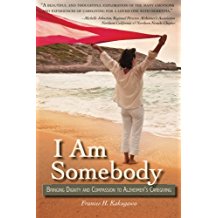 Frances Kakugawa, author of I Am Somebody, spoke of the powerful role poetry played in her caregiving role throughout her mom’s dementia journey. While scrubbing the floor after her mother’s bathroom accident, Frances thought, “There must be another poem here.” She decided to consider herself a poet-caregiver, rather than a struggling-caregiver. Reframing her image and her language helped her transform her attitude. You’ll enjoy visiting www.franceskakugawa.wordpress.com and learning more about Frances, her writing, and her many books.
Frances Kakugawa, author of I Am Somebody, spoke of the powerful role poetry played in her caregiving role throughout her mom’s dementia journey. While scrubbing the floor after her mother’s bathroom accident, Frances thought, “There must be another poem here.” She decided to consider herself a poet-caregiver, rather than a struggling-caregiver. Reframing her image and her language helped her transform her attitude. You’ll enjoy visiting www.franceskakugawa.wordpress.com and learning more about Frances, her writing, and her many books.
III.
Play
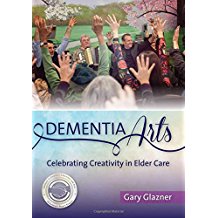 Who knew you could have so much fun with poetry! Gary Glazner, for one, founder of the Alzheimer’s Poetry Project, who lead the whole group in a rousing call and response version of several popular poems. Gary added in music, movements, and stoked up our enthusiasm and our energy. We also created a poem together. You’ll enjoy using his ideas to deepen your communications and your connections. Visit www.alzpoetry.com and treat yourself to his book, Dementia Arts: Celebrating Creativity in Elder Care.
Who knew you could have so much fun with poetry! Gary Glazner, for one, founder of the Alzheimer’s Poetry Project, who lead the whole group in a rousing call and response version of several popular poems. Gary added in music, movements, and stoked up our enthusiasm and our energy. We also created a poem together. You’ll enjoy using his ideas to deepen your communications and your connections. Visit www.alzpoetry.com and treat yourself to his book, Dementia Arts: Celebrating Creativity in Elder Care.
IV.
Support
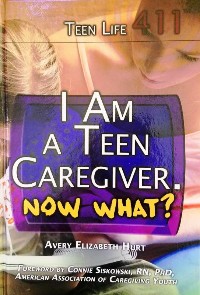 We were shocked and saddened to learn there are more than one million caregiving youth in our country, struggling to stay in school and keep afloat while taking care of ailing family members. Connie Siskowski’s organization, American Association of Caregiving Youth, provides support for these gallant middle schoolers and teens. To learn more about her program, visit www.aacy.org
We were shocked and saddened to learn there are more than one million caregiving youth in our country, struggling to stay in school and keep afloat while taking care of ailing family members. Connie Siskowski’s organization, American Association of Caregiving Youth, provides support for these gallant middle schoolers and teens. To learn more about her program, visit www.aacy.org
V.
Care
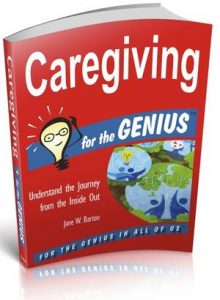 How many of us take enough time to truly care for and nurture ourselves. Jane Barton, speaker, write, and listener, spoke eloquently of compassion fatigue, born of too much caring for others and not enough focus on self. We laughed, cried, and reminded ourselves of the importance of self-care. Learn more from her at www.cardinalife.com and see her book, Caregiving for the GENIUS: Understand the Journey from the Inside Out.
How many of us take enough time to truly care for and nurture ourselves. Jane Barton, speaker, write, and listener, spoke eloquently of compassion fatigue, born of too much caring for others and not enough focus on self. We laughed, cried, and reminded ourselves of the importance of self-care. Learn more from her at www.cardinalife.com and see her book, Caregiving for the GENIUS: Understand the Journey from the Inside Out.
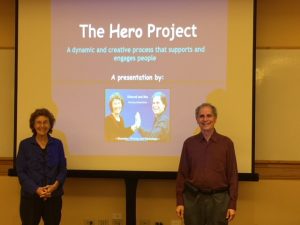 There were more amazing speakers, but we didn’t get to hear them because we were speaking all day Saturday, sharing two information-packed sessions of Connecting in the Land of Dementia and one session of our beloved The Hero Project. But just because we were teaching doesn’t mean we weren’t learning. Here are just a few of the tips we gathered from our participants.
There were more amazing speakers, but we didn’t get to hear them because we were speaking all day Saturday, sharing two information-packed sessions of Connecting in the Land of Dementia and one session of our beloved The Hero Project. But just because we were teaching doesn’t mean we weren’t learning. Here are just a few of the tips we gathered from our participants.
VI.
Give
As a way of adding meaning and purpose to life, one memory care day group created dog biscuits to donate to their local animal shelter. They stirred up a healthy mixture of organic ingredients, used cookie cutters, and delighted a lot of lonely pooches.
VII.
Collage
Another day care center helped a non-verbal resident create her own collage. One caring person watched carefully as this elder looked through a magazine, pausing at pictures of interest. Then the caregiver tore the photos that had intrigued the woman. Together, they glued them into a collage that the woman enjoys looking at often.
VIII.
Sing
“Song titles inspire singing and conversation,” one participant told us. She shouts out familiar titles and someone in her memory care group usually sings the next couple of verses, with others joining in. This often sparks a conversation about the song.
IX.
Share
The sense of community and generosity during the weekend reminded us again of why we love doing this work and of the importance of sharing things that work, things that don’t, and asking about things we wish we knew. Often, someone else has an answer for us, usually one of those quiet, but powerful, everyday heroes.


Chocolate Boosts Brain Health!
As the daughter of someone who lived with dementia, I do a lot of things to boost my brain health. I try to walk 10,000 steps a day, along with other exercise. I eat blueberries and broccoli. I do squats, try to memorize a few words of Spanish, and think about taking harmonica lessons. I try new things, laugh often, and practice drawing. But a recent study revealed that I was intuitively doing something else that was cheering on my brain, something I hadn’t even counted. Just in time for Halloween, it turns out Chocolate Boosts Brain Health!
I recently encountered a fascinating study on the Harvard Health website, and was intrigued when I read this headline: Cocoa: a sweet treat for the brain
Imagine being in Italy and contributing to scientific research by drinking a luscious dark cocoa drink every day for eight weeks. Then imagine feeling even more lucid, vibrant, and healthy after that experience. That is the essence of the Cocoa, Cognition, and Aging (CoCoA) Study, published in the American Journal of Clinical Nutrition in December 2014, with this flavorful title: Cocoa flavanol consumption improves cognitive function, blood pressure control, and metabolic profile in elderly subjects. (Note: It turns out some of the “elderly” subjects are as young as 61, an age some of us may argue is merely “middle-age.”)
A Chocolate Boost Makes Your Brain Boast
I am also in love with this Maine-Syracuse Longitudinal Study (MSLS), of 968 people that includes these mouth-watering assertions:
All cognitive scores were significantly higher in those who consumed chocolate at least once per week, than in those who never/rarely consumed chocolate.
“More frequent chocolate consumption was significantly associated with better performance on the Global Composite score, Visual-Spatial Memory and Organization, Working Memory, Scanning and Tracking, Abstract Reasoning, and the Mini-Mental State Examination,” said the research team, which included scientists from the University of Maine.
More Delicious Cocoa-flavored News
And another study from Loma Linda University, states:
“Dark chocolate, which is 70 percent cacao, is a major source of flavonoids –- powerful antioxidant and anti-inflammatory components that are known to be beneficial to cardiovascular health. The California team’s initial studies at Loma Linda University have shown that absorbed cacao flavonoids penetrate and accumulate in regions of the brain associated with learning and memory.”
“We are tremendously excited about what these findings could potentially mean for brain health,” said Lee Berk, DrPH, MPH, who led the team. “This may open the door for potential restorative uses for individuals with memory/recall or dementia and aging-related issues.”
Never Forget To Boost Your Brain
I now have a remedy for those days when I’m too tired to exercise, too busy for a crossword, too cranky for a brain game. Or for when I simply forget. On those days, I’ll simply treat myself to a taste of the dark side. And hope it leads me towards the light.
Want to learn more?
http://www.goodnewsnetwork.org/study-confirms-brain-and-memory-benefits-from-dark-chocolate/
http://www.health.harvard.edu/blog/cocoa


Insider Dementia Friendly Travel Tips, from Laurie Scherrer
This year, Laurie Scherrer is taking a number of trips: Atlanta, to speak at a conference, South Carolina, for a family reunion, and the Caribbean, as a speaker and participant in a dementia-friendly cruise. Since she is living with early onset dementia, Laurie plans out her trips, taking into consideration her needs and the chaos that can be a natural part of any journey. Here are some insider dementia friendly travel tips from Laurie.
Planning for a Smooth Flight
Laurie contacts TSA and her airline, notifying them of her disability, so they can mark it on her ticket. She and her husband both paid for a TSA pass, so they can go in together. That helps her avoid the bombarding noise, distraction, and exhausting wait inherent in a long check-in line
“The TSA staff will walk you through the line,” she says.
Laurie is sensitive to noises, so the constant airport announcements, the din of hundreds of conversations, and the drone of background sounds present challenges.
“I walk into a restaurant and I hear the clanging of the dishes, the forks on the plates, the waiter’s shoes thudding against the floor,” she says. “I have lost my ability to filter sound, and those noises are as strong as any conversation I’m having.”
To minimize distraction and confusion and to help her concentrate, Laurie often wears noise-cancelling headsets.
Once in the airport, she tries to find a quiet place to sit.
“I don’t sit at the gate for two hours with a slew of people,” she says. “Sometimes a restaurant or bar is quiet. For overseas trips, you can try to get access to an airport lounge.”
She tries to get a seat towards the front of the plane, to avoid additional waiting and wading through a crush of passengers.
Packing it Up
Two weeks before a trip, Laurie organizes her clothes for each day. She puts on an outfit, then takes a picture of it.
“On the picture I write, ‘Purple shirt, black slacks, white sneakers, white socks, etc.,’” she says. “Then when I pack, I put each day’s entire outfit together, including socks and underwear. That makes getting dressed so much easier.”
Getting Oriented
At any new hotel, Laurie and her husband walk around the entire building so Laurie can get oriented. When she is traveling alone, she talks to the hotel manager, to explain her situation. At one lodge, the receptionist escorted Laurie to her room and helped her unpack. Laurie carries a tag with her name and room number on it, in case of sudden confusion.
“Don’t be afraid to ask for help,” she says.
Taking Breaks
Laurie has already planned her quiet time and her personal getaways for the upcoming cruise, where she is both a traveler and a speaker/educator.
“On cruise ships, the library is often a quiet haven,” she says.
She also avoids group shore excursions, as it is hard for her to enjoy being in a crowd.
But it’s not hard for Laurie to relish travel and to revel in engaging in new experiences and meeting new people. It just takes a little planning and a lot of taking care of herself. #
To learn more about Laurie, visit https://dementiadaze.com/about-me/


